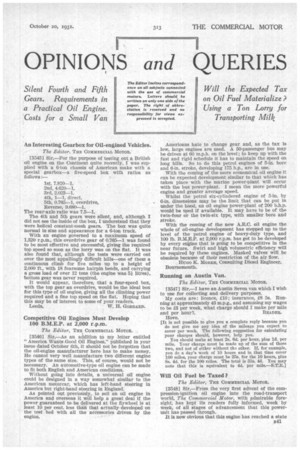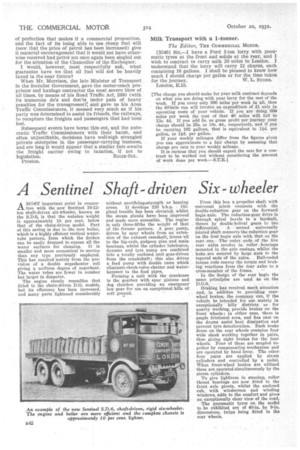OPINIONS and QUERIES An Interesting Gearbox for Oil-engined Vehicles.
Page 59

Page 60

If you've noticed an error in this article please click here to report it so we can fix it.
The Editor, THE COMMERCIAL MOTOR.
[3545] Sir,—For the purpose of testing out a British oil engine on the Continent quite recently, I was supplied with a 6-ton chassis of American make with a special gearbox—a five-speed box with ratios as follows : 1st, 7.870-1.
2nd, 4.620-1,.
3rd, 2.023-1.
4th, 1-1, direct.
5th, 0.765-1, overdrive, Reverse, 9.680-1.
The rear-axle ratio was 7.5-1.
The 4th and 5th gears were silent, and, although I did not see the inside of the box, I understand that they were helical constant-mesh gears. The box was quite normal in size and appearance for a 0-ton truck.
With an engine governed to a maximum speed of 1,320 r.p.m., this overdrive gear of 0.765-1 was found to be most effective and successful, giving the required top speed so soon as the lorry was on the fiat. It was also found that, although the tests were carried out over the most appallingly difficult hills—one of them a continuous climb for five miles up to a height of 2,000 ft., with 18 fearsome hairpin bends, and carrying a gross load of over 12 tons (the engine was 5 litres). bottom gear was never required.
It would appear, therefore, that a four-speed box, with the top gear an overdrive, would be the ideal box for this type of oil engine, giving all the climbing power required and a fine top speed on the flat. Hoping that this may be of interest to some of your readers.
Leeds, W. H. GODDARD.
Competitive Oil Engines Must Develop 100 B.M.E.P. at 2,000 r.p.m.
The Editor, THE COMMERCIAL MOTOR.
[3546] Sir,—As an addition to my letter entitled "America Wants Good Oil Engines," published in your issue dated October 6th, it should not be forgotten that the oil-engine manufacturer here has to make money. He cannot very well manufacture two different engine types of the same size. This, of course, would not be necessary. An automotive-type oil engine can be made to fit both English and American conditions.
Without going into details, a universal oil engine could be designed in a way somewhat similar to the American motorcar, which has left-hand steering in America hut right-hand steering in England.
As pointed out previously, to sell an oil engine in America and overseas it will help a great deal if the power guaranteed to be delivered at the flywheel is at least 10 per cent, less than that actually developed• on the test bed with all the accessories driven by the engine.
Americans hate to change gear and, as the tax is low, large engines are used. A 50-passenger bus may be driven at 60 mph. on the level; to keep up with the fast and rigid schedule it has to maintain the speed on long hills. So to do this petrol engines of 5-in, bore and 6-in, stroke, developing 175 hp., are in use.
With the coming of the more economical oil engine it can be expected development similar to that which has taken place with the marine power-plant will occur with the bus power-plant. I mean the more powerful engine and greater average speed. Whilst the petrol six-cylindered engine of 5-in. by 6-in, dimensions may be the limit that can be put in under the hood, an oil engine power-plant of 200 b.h.p. _would be used if available. It may have to be Of the twin-four or the twin-six type, with smaller bore and stroke.
With the coming of the new A.E.C. oil engine the whole of oil-engine development has stepped up to the level of the petrol engine of heavy-duty type, and 100 lb. B.M.E.11. at 2,000 r.p.m. has got to be developed by every engine that is going to be competitive in the near future. Swirl and high volumetric efficiency will be required by these engines. Masked valves will be obsolete because of their restriction of the air flow. Iluoo K. MOREN, Consulting Diesel Engineer. Bournemouth.
Running an Austin Van.
The Editor, THE COMMERCIAL MOTOR.
[3547] Sir,—I have an Austin Seven van which I wish to use for collecting and .delivery purposes.
My costs are : licence, £10; insurance, £8 Ss. Running at approximately 43 m.p.g., and assuming my wages to be £3 per week, what charge should I make per mile
and per hour?. READER. Hove.
[It is not possible to give you a complete reply because you do not give me any idea of the mileage you expect to cover per week. The fallowing suggestion for calculating your charges should, however, help yon. You should make at least 2s. 6d. per hour, plus Id. per mile. Your charge most be made up of the sum of those two, and not of either without this other. If, for example, you do a day's work of 10 hours and in that time cover 100 miles, your charge must be 25s. for the 10 hours, plug 8s. 4d. for the 100 miles. The total is 33s. 4d. You may note that this is equivalent to 4d. per mile.—S.T.]It.] Will Oil Fuel be Taxed ?
The Editor, THE COMMERCIAL MOTOR.
[3548] Sir,—From the very first advent of the compression-ignition oil engine into the road-transport world, The Commercial Motor, with admirable foresight, has kept its readers fully informed, week by
• week, of all stages of advancement that this powerunit has passed through.
It is now obvious that this engine has reached a state of perfection that makes it a commercial proposition. and the fact of its being able to use cheap fuel will (now that the price of petrol has been increased) give it material encouragement that it would not have otherwise received had petrol not once again been singled out for the attention of the Chancellor of the Exchequer.
I would, however, most respectfully ask, what guarantee have we that oil fuel will not be heavily taxed in the near future?
When Mr. Morrison, the late Minister of Transport in the Socialist Government, gave the motor-coach proprietor and haulage contractor the most severe blow of all times, by means of his Road Traffic Act, 1930 (with its numerous do's and don'ts under pain of heavy penalties for the transgressor): and gave us his Area Traffic Commissioners, it seemed very much as if his party was determined to assist its friends, the railways, to recapture the freights and passengers that had been lost.
Subsequent events have borne this out, and the autocratic Traffic Commissioners with their harsh, and often unjustifiable, decisions have well-nigh strangled private enterprise in the passenger-carrying business, and ere long it would appear that a similar fate awaits the freight carrier owing to taxation, if not to legislation.
Preston.
Milk Transport with a 1-tonner.
The Editor, THE COMMERCIAL MOTOR.
[3549] Sir,—I have a Ford 1-ton lorry with pneumatic tyres at the front and solids at the rear, and I wish to contract to carry milk 20 miles to London. I understand that the lorry will carry 12 churns, each containing 16 gallons. I shall be pleased to know how much I should charge per gallon or for the time taken
for the journey. W. L. STONE. London, E.10.
[The charge you should make for your milk contract depends on what you are doing with your lorry for the rest of the week. If you cover only 300 Miles per week in all, then the 40:raile run will involve an expenditure of £1 only 41 operating costs of your vehicle. If you are doing 600 miles per week the cost of that 40 miles will fall to
• 13s. 4d. If you add 5s. as gross profit per journey your charge should be 25s. or 18s. 4d., respectively, and if you be carrying 192 gallons, that is equivalent to 1-id. per gallon, or l*d per gallon.
If your weekly mileages differ from the figures given you can approximate to a fair charge by assessing that charge pro rata to your weekly mileage.
It is curious that you should expect the rate for a contract to be worked out without considering the amount of work done per week.—S.T.R.]




































































































